Several states now have laws targeting fake news and more are thinking about it. But are governments responsible for pushing back against deliberate disinformation online? Should the news media or social media play a bigger role - or none of the above? Mediawatch reports from Singapore where the government is debating whether to outlaw fake news.
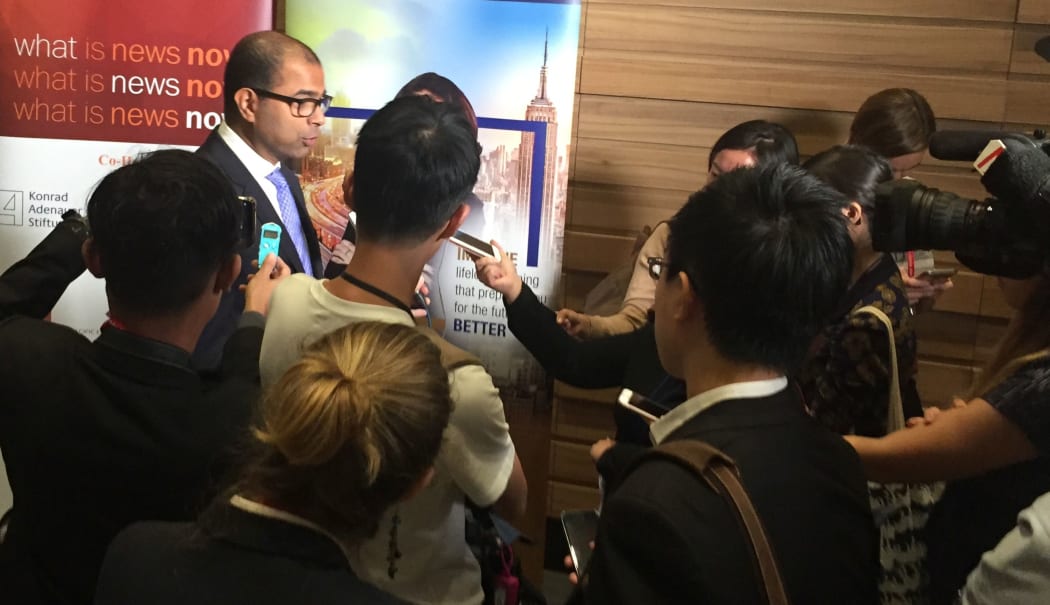
Singapore government communications minister Dr Janil Puthucheary faces the press on the proposed law to fight fake news. Photo: PHOTO / RNZ Colin Peacock
When Donald Trump fell for a fake call from podcasting prankster Stuttering John this week, there wasn’t much sympathy in the media. That's hardly surprising as the President has so often dismissed the media as ‘fake news’ - in addition to spreading lots of it himself.
Donald Trump mostly rages about stories merely inconvenient or embarrassing to him - whether they're true or false - but ever since he began using the term, its use has snowballed.
When demonstrably false political stories from fake news ‘farms’ started spreading on social media in 2016, this became a much bigger problem. When it happened in subsequent elections around the world, it became clear deliberate disinformation online was not just an American issue.
Alarming stories of violence stirred up by mischievous misinformation on social media are cropping up all round the world now, as well as attacks on news media and individual journalists.
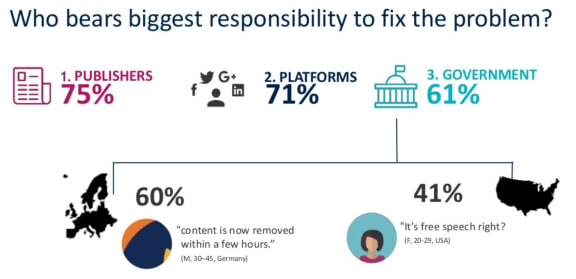
Digital News Report 2018 from Reuters Institute for the Study of Journalism, Oxford University. Photo: Reuters Institute for the Study of Journalism
Calls for action are growing. But who should act?
In its recently-released annual survey of the world media scene, the Reuters Institute for the Study of Journalism surveyed thousands of people in 23 countries. Three quarters of them agreed media companies should do more to separate real and fake stuff on the internet. 71% said technology companies like Facebook and Google should act on that and 61% said their government should do more.
But can that be done without compromising the freedom of the press?
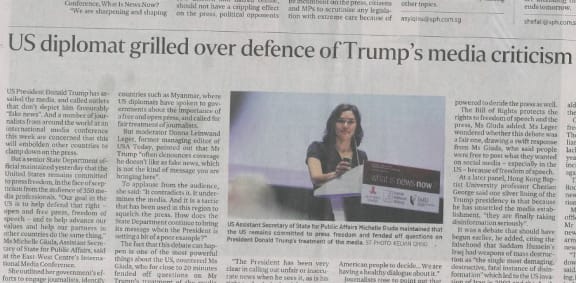
Michelle Guida's defence of Donald Trump's "fake news" attacks on media made the news in The Straits Times. Photo: PHOTO / RNZ Colin Peacock
Intriugingly, a representative of the Trump administration turned up to tackle the issue at an international media conference in Singapore called What is News Now?
Michelle Guida - recently appointed as US Assistant Secretary of State for Public Affairs - told the gathering fake news was nothing new. Julius Caesar, Octavian and Mark Anthony engaged in "infowars" in ancient Rome, she said.
Ms Guida also raised eyebrows referring to the third US President's famous quote:
"Were it left to me to decide whether we should have a government without newspapers, or newspapers without a government, I should not hesitate a moment to prefer the latter."
- Thomas Jefferson, 1787
A former newspaper editor - Donna Leinwand Leger from USA Today - put it to Michelle Guida that was not exactly consistent with the conduct of the 45th President she currently serves.
Furthermore, Trump's rhetoric "empowers other leaders to act the same way and squelch press freedom," she said.
“The President has been very clear in calling out unfair or inaccurate news when he sees it as it is his right to do,” said Ms Guida.
"One of the great and powerful things about the United States is that we can have this debate. It's for the news media to now report on it. We're having a conversation and a healthy dialogue about it," she said.
But journalists at the What is News Now conference were not finding that a healthy position on fake news.
"I think it has an impact beyond the feelings of the American media. We have traditionally been pushing for freedom of the press and freedom of speech around the world where those traditions don't always exist," said Joshua Benton, a former newspaper journalist in Texas who’s now director of the Nieman Journalism Lab at Harvard University.
"It doesn't help our cause the we have a president teaching other leaders how to condemn things as fake news," he told Mediawatch
One leader who has certainly followed President Trump’s example is Rodrigo Duterte in the Philippines who routinely condemns critical reporting of his leadership as "fake news".
Throwing the book at fake news
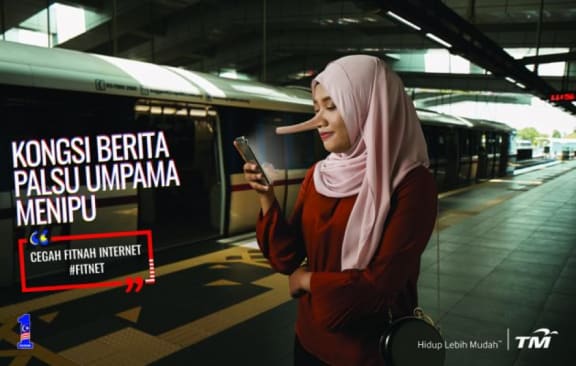
"Sharing a lie makes you a liar" says this ad from Telecom Malaysia. Photo: PHOTO / Twitter
But in other Asian countries, leaders have clamped down on fake news. Laos and Vietnam have laws to outlaw disinformation and punish its dissemination.
Malaysia has the Anti-Fake News Act 2018 which covers “news, information, data and reports which is or are wholly or partly false”. The law covers digital publications and social media and it even applies to people outside Malaysia - if Malaysian citizens or the Malaysian state are affected.
Critics say the new law could be used to criminalise opinions critical of the government. Some call it the 'Anti 1MDB Law' after the so-called 1MDB multibillion-dollar corruption scandal which saw the former PM Najib Razak arrested last Wednesday.
The new government elected in May has vowed to repeal the controversial law.
But by the time that happens the neighbouring city state Singapore may have a new fake news law of its own.
In the wake of the Cambridge Analytica scandal and revelations that clients in Russia had paid Facebook for pro-Trump content for the US election, Singapore set up the 'Select Committee on Deliberate Online Falsehoods.'
During public hearings in April, there were testy exchanges with Facebook’s executives about the company's record - especially in taking offshore payments for political advertising.
At the What is News Now conference in Singapore Facebook's public policy chief South east Asia Alvin Tan pleaded for understanding.
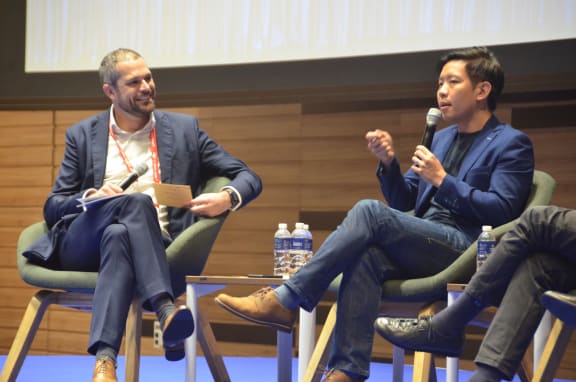
Facebook's public policy chief for South East Asia Alvin Tan faces questions about the platforms plans for fake news. Photo: PHOTO / RNZ COlin Peacock
Facebook does filter out the worst stuff online, he said, and it gets rid of millions of potentially malicious accounts at the point of registration. But he said the sheer volume of material on Facebook makes it hard to stop.
he said third party factchecking has been expanded to 14 Asia-Pacfic countries and this has has helped stem the spread of fake news there.
So should Singapore - or other country - actually pass laws to criminalise the creation and dissemination of disinformation - and also bring social media platforms to heel?
In a state that already has a lot of power over business and public life, could that be used to muzzle the media and dissenting voices?
At the What is News Now? conference Singapore’s Senior Minister of State for Communications and Information Dr Janil Puthucheary insisted his government wouldn’t do that and that it was in no hurry to change the law.
But the editor of Singapore’s main paper the Straits Times Warren Fernandez said he couldn’t give the government a blank cheque support a law that might hamper efforts to check the facts about a contentious story.
"I'm certain they have legislation in mind," he told Mediawatch.
"They have been careful to say any law would be narrow and focus only on egregious forms of disinformation - like external governments attempting to destabilise race relations - but we need to scrutinise any Bill that's tabled to ensure the government is not conveniently giving itself powers it shouldn't have," said Mr George, now now a professor of journalism at Hong Kong Baptist University.
Cherian George has some experience of butting up against the powers-that be in the city state of Singapore. As a journalist and academic there in the past he was a critic of the government and its powers of censorship and media control. Through companies like MediaCorp and Singapore Press Holdings the state controls the purse strings of Singapore’s media.
In a recent book Hate Spin he argued criminal law is needed to combat disinformation that incites violence or make false medical claims, but society’s response must work with – not against – the right of citizens to seek, receive and share information and ideas about matters of common concern.
But Facebook - which is the conduit for much of the fake news and disinformation under discussion - beyond the scope of any national law now that it has more two billion users around the world?
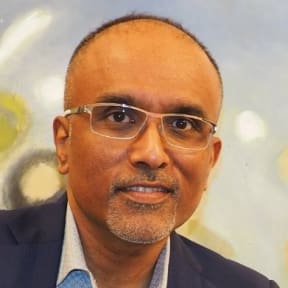
Prof. Cherian George, Hong Kong Baptist University. Photo: supplied
"The debate on this is evolving very fast," said Professor George.
"Conventional wisdom is that they do have responsibility similar to that which companies to ensure the environment is not wrecked as a result of their activity. They can't handle the volume of stuff that is on their own platform in a way that doesn't compromise their own business model," he said.
"They say they are trying but they really mean up to a limit where it costs their business. Facebook is more responsive to bigger commercial markets and less responsive in countries where Facebook may be causing more damage but they lack the economic clout to push Facebook," he said.
Professor George cited Myanmar is a "classic case".
Facebook's Alvin Tan acknowledged there is more work to do and they need users' help to identify problems.
"These are not platitudes. We are working hard on this," he told the What is News Now conference.
"I'm sorry but that seems like passing the buck," Prof Cherian George told Mediawatch.
"We should not be expected to help them police their own terms of service. If you can't cope, get out of the business."
Colin Peacock attended the What Is News Now? conference in Singapore with a travel grant from the Asia New Zealand Foundation

